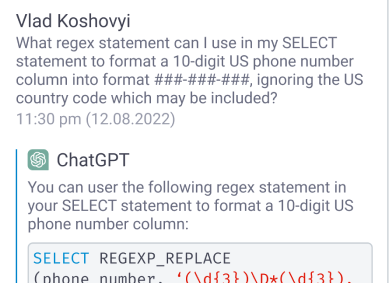We’re thrilled to announce the release of Coginiti 23.6! This release takes Coginiti to the next level with groundbreaking AI capabilities, native support for Databricks, and robust new CoginitiScript testing capabilities that allow developers to write and execute tests within SQL code blocks.

Coginiti AI Advisor at Your Service
 Experience a major upgrade to your analytics workflow. The Coginiti AI Advisor, accessible via a new left-hand panel, puts the power of generative AI at your fingertips, bringing improved efficiency, accuracy, and productivity to your data-driven tasks.
Experience a major upgrade to your analytics workflow. The Coginiti AI Advisor, accessible via a new left-hand panel, puts the power of generative AI at your fingertips, bringing improved efficiency, accuracy, and productivity to your data-driven tasks.
Our initial integration leverages the impressive capabilities of OpenAI ChatGPT, making it easier than ever to build and optimize queries, understand error messages, and explain complex SQL code blocks. Simply enter your API key on the AI setup screen to get started. (You can get your OpenAI API Key here.)
Additional large language model options are planned for future releases, including GitHub Copilot, Amazon CodeWhisperer as well as Coginiti’s own proprietary model.
We are committed to Responsible AI. You decide when to turn the AI module on or off, which generative AI model to connect to, and whether to share metadata with Coginiti’s 3rd party integrations.
Connect to Databricks
Coginiti now offers comprehensive support for the Databricks Lakehouse Platform, providing a unified solution for data processing, engineering, and analyst workloads.
By pairing the scalability and performance of Databricks with Coginiti’s powerful query and analysis tools, you can query, process, and analyze massive volumes of data with unparalleled efficiency. This integration also brings Coginiti’s data browsing, search, and filtering capabilities, empowering you to effortlessly discover datasets shared through the Unity Catalog, including Hive metastores.
Read more about our support for Databricks.
New CoginitiScript Testing Capabilities
CoginitiScript now includes a built-in testing framework empowering analytic developers to write and execute assertion tests as SQL code blocks to ensure the accuracy and reliability of their data.
A test block is structured as follows:
#+test sql TestName() #+begin -- Your SQL test code here #+end
See it in action at timestamp 1:52 in the video above. Refer to our CoginitiScript Tests documentation for additional technical details and roadmap.
Some example use cases include:
- Validating Patient Data in Healthcare Analytics: In a hospital’s data analytics pipeline, CoginitiScript testing can perform crucial patient data validation before further analysis. This could be as simple as confirming that new patient records have the right number of fields or checking that patient IDs match across different data sources.
- Ensuring Data Consistency in Insurance Claims Processing: Insurance companies deal with a large number of claims, which are often processed through automated systems. A CoginitiScript test could be used to confirm that the total number of claims recorded in the database matches the number of claim applications received in a given period, ensuring no claim was lost or duplicated in the system.
- Quality Assurance for Predictive Models in Healthcare: Predictive models are commonly used in healthcare to forecast patient outcomes or identify health risks. However, these models are only as good as the data they are trained on. Data analysts can use CoginitiScript testing to validate the input data for these models, checking for outliers or missing values that could distort the predictions. This can help ensure that the models are making accurate predictions and contributing to high-quality patient care.
- Compliance Auditing in Banking: Banks are subject to a variety of regulations that require them to maintain accurate records of their transactions. For example, an analyst could use CoginitiScript testing to confirm that all transactions over a certain value have the necessary approval flags set in the database, helping to ensure compliance with anti-money laundering regulations.
User Account Authentication for Google Cloud Storage
Lastly, building on the success of our Object Store integration, we’re enhancing our Google Cloud Storage connection capabilities. From now, users can authenticate using their individual Google accounts, making it even easier to access and manage your data assets.
Your feedback is vital in shaping our roadmap, and we can’t wait to hear about the innovative ways you’ll utilize these new features. If you aren’t a Coginiti user yet, download your Coginiti trial to experience these exciting new capabilities for yourself!





